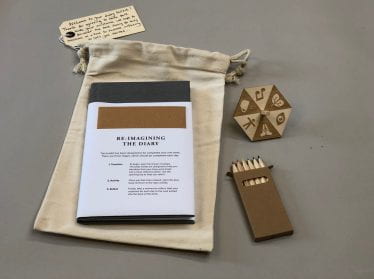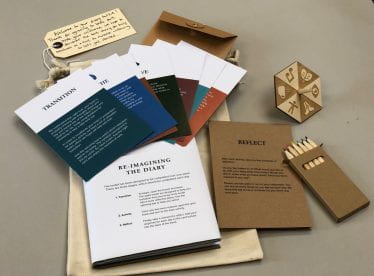Reimagining the Diary: Writing and well-being for busy people
Can diary writing improve wellbeing? Is it time to "reimagine" the diary? Are there ways for busy people to engage in diary writing? This project looks at the past, present and future of diary writing in relation to wellbeing. It explores ethical considerations, barriers and creative formats.

What did the project involve?
This Experimental Partnership emerged from the 2018 Ideas Exchange “Reimagining the Diary: Writing and well-being for busy people”. The project sought to tackle the topic of diary writing through 3 strands: past, present and future.
The researchers used excerpts from Mass Observation diaries to explore why people kept diaries in the past and different ways they were written. The present strand will work with busy professionals (teachers) to investigate what encourages or dissuades diary writing.
This strand developed to become a future strand, which worked with the creative media company ‘Stand and Stare’ to reimagine the diary for busy professionals – in this case teachers – and produce a diary toolkit that will assist in positive teacher wellbeing.
For more insight into the process read this blog by a teacher participant about the launch workshop for Reimagine the Diary: Blog: Why I Love Reimagine the Diary
This project created a prototype toolkit for teachers interested in using diaries to manage their own wellbeing. The diary is designed around three stages that you complete each day: transition, activity, reflect.
Who are the team and what do they bring?
- Lucy Kelly (School of Education, University of Bristol) is a researcher and author whose main research area is diary keeping as a positive tool for teacher wellbeing.
- Grace Huxford (History, University of Bristol) is a social and oral historian of modern Britain interested in the histories of people affected by war and militaries, such as military families and children, as well as the long-term impact of conflict on memory, gender and selfhood.
- Catherine Kelly (School of Law, University of Bristol) research focuses on the law’s interaction with science and medicine in both historical and contemporary contexts. She has a particular interest in the history and regulation of the professions.
- Lucy Telling and Barney Heywood (Stand + Stare) create interactive installations, exhibitions and performances. Their automated experiences are often based on historical material and memory, which has led them to work with museums, libraries, universities and a variety of organisations seeking innovative ways in which to open up their archives.
What were the results?
The research team cowrote a policy briefing which you can read here: Policy Briefing: Diary Toolkit should be rolled out in schools to support teacher wellbeing.
They intend to apply for further funding to continue this project. The researchers would like to use this pilot study to create a working hypothesis. They would like to transfer this learning to new groups who are under a great deal of professional stress, e.g. NHS workers.
Together Lucy, Grace and Catherine cowrote a journal article summarising their findings : ‘In Our Daily Struggles’: (2020) ‘In Our Daily Struggles’: Diaries as a Tool for Teacher Well-being,
Find below an article by Lucy Kelly authored at the end of the research project “Reclaiming teacher wellbeing through reflective diary-writing” or listen to her podcast on The Well Teacher Podcast “Can reflective diary entries be the key to solving teacher retention and wellbeing?”
Stand + Stare wrote a blog on their website exploring their involvement and collaboration with the project.
Finally, the project has grown and extended into many other iterations exploring the benefits of diary keeping:
Reimagining the Diary: Reflective practice as a positive tool for pupil mental health and wellbeing.
Reimagining the Diary: diary-keeping as a positive tool for teacher wellbeing.



